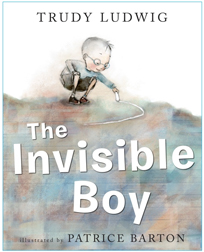 As you have come to know by now, I usually post about great children's literature and how I'm going to (or have) used it with my students. Today, I'm writing about a new book I was so very fortunate to receive last week...a book too good to wait to share with all of you. I will eventually figure out what my lesson around this book will look like and I'll share that with you someday. Actually, I may have just found my "theme" for next school year...
As you have come to know by now, I usually post about great children's literature and how I'm going to (or have) used it with my students. Today, I'm writing about a new book I was so very fortunate to receive last week...a book too good to wait to share with all of you. I will eventually figure out what my lesson around this book will look like and I'll share that with you someday. Actually, I may have just found my "theme" for next school year...The Invisible Boy, written by the amazing Trudy Ludwig, is one of those books you need to run out to buy. The story line is so spot on and the illustrations are really just perfect.
Brian is not noticed or included by others, so he gets lost in his incredible drawings. Brian's brief smile leads to a potential friendship and his hand drawn gift for Justin, a new student, got him the notoriety he was longing for. Justin knew that Brian would be an important contributor to a group project and made sure Brian was included the formation of a group. Justin helped Brian feel like he belonged, like he was worthy, and like he deserved to have friends. Brian was no longer "invisible."
Here is the review I posted on Amazon:
As an urban elementary school counselor, children’s literature is an important staple in my programming. The picture books I choose first speak to me and then, upon reading, I facilitate a process in which they speak to my students. I love books and my students love when I read to them!
When choosing quality children’s literature, I look for a strong, meaningful message, characters that my students will identify with, and a story line that not only tugs at your heart, but also may include some comedic moments. Never do I miss purchasing children’s literature by Trudy Ludwig – I own all of her titles. In my eyes, she meets all of the above criteria (and then some) in her literary works of art.
The Invisible Boy is an exemplary example of quality children’s literature. The story is quite touching and very pertinent to elementary educators and parents everywhere. The illustrations by Patrice Barton bring the words on the page to life. She captures the nature of childhood – so innocent, so expressive, so honest.
I couldn’t believe how the very first page of this story set the tone for the whole book and “said” so much – in the words on the page and in the illustrations. It speaks to teachers, school counselors, parents, children…”Can you see Brian, the invisible boy? Even Mrs. Carlotti has trouble noticing him in her classroom. She’s too busy dealing with Nathan and Sophie.” On the first page, the “invisible Boy” is first in line behind the teacher (illustrated in black and white) and part of the class is seen in line behind him (illustrated in color and either acting up, whispering, staring, laughing, or looking with amazement). You too, will be loving this story from page one…
The Invisible Boy is an exemplary example of quality children’s literature. The story is quite touching and very pertinent to elementary educators and parents everywhere. The illustrations by Patrice Barton bring the words on the page to life. She captures the nature of childhood – so innocent, so expressive, so honest.
I couldn’t believe how the very first page of this story set the tone for the whole book and “said” so much – in the words on the page and in the illustrations. It speaks to teachers, school counselors, parents, children…”Can you see Brian, the invisible boy? Even Mrs. Carlotti has trouble noticing him in her classroom. She’s too busy dealing with Nathan and Sophie.” On the first page, the “invisible Boy” is first in line behind the teacher (illustrated in black and white) and part of the class is seen in line behind him (illustrated in color and either acting up, whispering, staring, laughing, or looking with amazement). You too, will be loving this story from page one…
Look for a future post on how to use this book in your school! Thank you, Trudy, for another great story!







